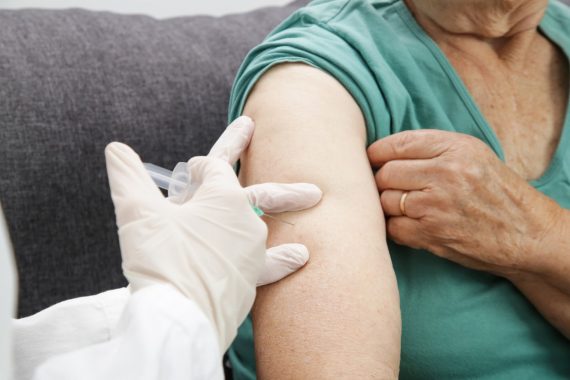The first vaccine against respiratory syncytial virus (RSV) suitable for both pregnant women and older adults has been approved by UK regulators.
A bivalent recombinant vaccine developed by Pfizer called Abrysvo has been licensed by the Medicines and Healthcare products Regulatory Agency (MHRA) based on the results from two separate trials published earlier this year, and is intended for both pregnant individuals to help protect their infants, and adults over 60.
It comes after the Joint Committee on Vaccination and Immunisation (JCVI) recommended in June that the UK introduces routine RSV vaccination for both babies and the over 75s.
The committee had reviewed several vaccines in development, including Abrysvo, because it and others were due for approval either this year or 2024.
It said it had made early recommendations to allow sufficient lead time for the Government to get a policy and programme in place.
But the JCVI had no preference whether a maternal vaccination or a passive immunisation programme should be chosen to protect babies. It also said three potential products for the over-75s should all be considered.
It also did not specify a timeline for rollout and the DHSC said it is reviewing options together with UKHSA.
RSV causes up to 15,000 babies under six months to be hospitalised in England every year and in winter, as many as one in six of all UK hospital admissions of babies and children are due to bronchiolitis with 80% of cases are associated with RSV.
For older adults in the UK, it is estimated that RSV leads to 175,000 GP visits and 14,000 hospital admissions annually.
In one trial published in the New England Journal of Medicine in April, the Pfizer RSV vaccine given during pregnancy was shown to be effective against severe RSV-associated lower respiratory tract illness in infants up to six months old.
And in a second ongoing trial, the vaccine prevented RSV-associated lower respiratory tract illness and RSV-associated acute respiratory illness in adults over 60 years of age.
Julian Beach, interim executive director of healthcare quality and access at the MHRA, said: ‘We are pleased to confirm that we have authorised the Abrysvo vaccine for protecting against lower respiratory tract disease caused by respiratory syncytial virus (RSV) via our reliance procedure.
‘Abrysvo has been authorised in adults 60 years of age and older and in pregnant women to protect their infants from birth through 6 months of age following maternal immunisation.
‘No medicine would be approved unless it meets our expected standards of safety, quality and effectiveness.’
A Department of Health and Social Care spokesperson said: ‘The NHS already offers monoclonal antibodies which provide protection against RSV to infants at very high risk.
‘We are developing options for delivering wider infant and adult RSV programmes, in collaboration with the UK Health Security Agency, NHS England, and manufacturers. We will update in due course.’
Professor Beate Kampmann, professor of paediatric infection and immunity at The London School of Hygiene and Tropical Medicine said, who led on the trial in pregnancy said: ‘The availability of a vaccine represents an opportunity to reduce serious complications of respiratory disease associated with the virus.
‘This could save countless parents and family members the ordeal of seeing children and loved ones fighting the complications of the virus on a hospital ward – and also ease pressure on the health service at the most overstretched time of year.’
Dr Ronnie Cheung, consultant general paediatrician at Evelina London Children’s Hospital said: ‘The number of infants seeing GPs or coming into hospital because of RSV infections is already increasing week on week.
‘The recent arrival of RSV vaccines should herald a new dawn for tackling this pervasive disease and yet, clinicians and parents continue to be frustrated by delays in the implementation of a national RSV immunisation programme.
‘It is imperative that the advice of experts and NHS staff is listened to and a national RSV immunisation programme is implemented promptly.’
Please note, this story was amended at 12:15 on 30 November 2023. It originally stated that the vaccine was for infants. We apologise for the error
Pulse October survey
Take our July 2025 survey to potentially win £1.000 worth of tokens













On the one hand, RSV causes sufficient disease and death to warrant vaccination programs.
But on the other, there is no apparent urgency to get people vaccinated, with the usual foot-dragging from the NHS when dealing with any advance.